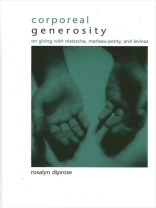Rosalyn Diprose contends that generosity is not just a human virtue, but it is an openness to others that is critical to our existence, sociality, and social formation. Her theory challenges the accepted model of generosity as a common character trait that guides a person to give something they possess away to others within an exchange economy. This book places giving in the realm of ontology, as well as the area of politics and social production, as it promotes ways to foster social relations that generate sexual, cultural, and stylistic differences. The analyses in the book theorize generosity in terms of intercorporeal relations where the self is given to others. Drawing primarily on the philosophy of Nietzsche, Merleau-Ponty, and Levinas, and offering critical interpretations of feminist philosophers such as Beauvoir and Butler, the author builds a politically sensitive notion of generosity.
Inhaltsverzeichnis
Acknowledgments
Introduction: Introducing Generosity
Part I. Giving Identity and Difference
1. Nietzsche and the Pathos of Distance
2. Giving Sexed Corporeality before the Law
3. Performing Body-Identity through the Other
Part II. Generosity and the Politics of Affectivity
4. Erotic Generosity and Its Limits
5. Affectivity and Social Power: From Melancholia to Generosity
6. Sexuality and the Clinical Encounter
Part III. Generosity and Community (Trans)Formation
7. Thinking through Radical Generosity with Levinas
8. Truth, Cultural Difference, and Decolonization
9. Generosity, Community, and Politics
Conclusion
Notes
Bibliography
Index
Über den Autor
Rosalyn Diprose is Senior Lecturer in Philosophy at the University of New South Wales, Sydney, Australia. She is the author of
The Bodies of Women: Ethics, Embodiment and Sexual Difference.












